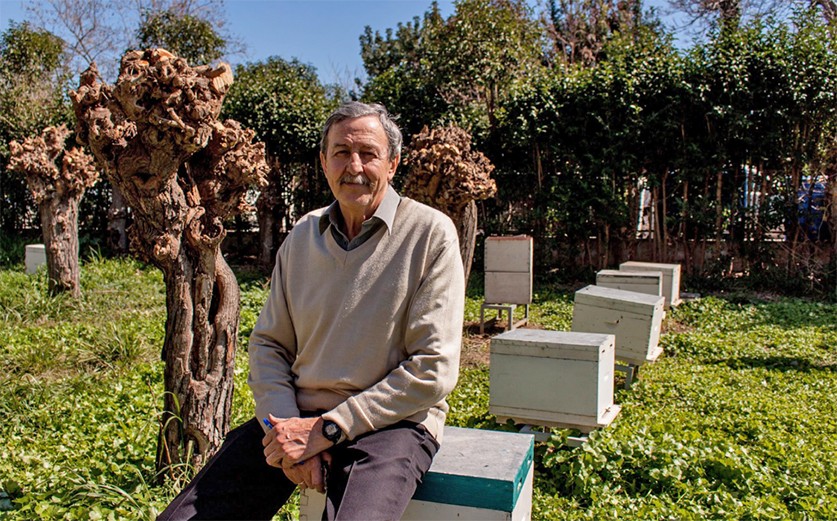Meet Paschalis
Paschalis Harizanis, 66, was born in Serres. He is a professor in the Faculty of Crop Science and Director of the Laboratory of Sericulture and Apiculture at the Agricultural University of Athens (AUA), where he teaches classes in the Pathology of Bees and Silkworms, the Pathology of Productive Insects, and Sericulture and Apiculture. His Sericulture Laboratory, part of the Ministry of Agricultural Development and Food, is the silk farming reference laboratory for all of Greece. He leads the Apiculture program implemented by Agricultural University of Athens for the program New Agriculture for a New Generation.
Paschalis’ interest in bees began when he was 12 years old, a student at the American Farm School (AFS). The first class he took at AFS was an apiculture class, and though he didn’t intend to study apiculture, the school changed his mind. He received a BS degree in General Agriculture from Aristotle University, and while at university, he spent his summers working at AFS. In the summer of 1973, his first summer working at the school, he met a professor of apiculture from the Ohio State University--Columbus who was providing foreign technical assistance to Greece. “I asked if I could help him and learn some beekeeping,” Paschalis said. “And at the end of the summer, he asked me if I wanted to go to the US and Canada for three months the following summer to live with two beekeeping families. Of course I said yes.” The next summer, Paschalis split his time between Canada and the US. While there, he was able to develop his English skills, and in Canada, his professor took him to an apiculture congress where he met a professor from the University of California, Davis, who encouraged him to apply for a PhD. “I was already a beekeeper at that point, so I didn’t have to learn the techniques--that was a big plus for me,” Paschalis said. “This chain of circumstances led me to my Master and PhD in Entomology at UC Davis.” He returned to Greece in 1983 and worked as a professor at the Technological Educational Institution of Thessaloniki. He also started a successful beekeeping business that he ran until he started working at AUA in 1994. “Beekeeping is my whole life, my hobby and my business,” Paschalis said.
I visited Paschalis during his apiculture class at AUA as he demonstrated for his students how to open a hive for inspection. We stood around him in a circle wearing our beekeeper’s masks as he lit pine needles in the smoker and removed frames to show us the different types of bees, the eggs in their cells, and the queen. He scraped some honey from a frame and held it out to us. “Taste, taste!” he said. It tasted sweet, made from eucalyptus and other plants and flowers from the area. Every week, the students examine a different type of honey. This week, they examined the moisture of pine honey using a refractometer. “According to EU standards, the percent of water in pine honey should not exceed 20%,” Paschalis said. “If the honey has too much moisture, it becomes thin and will ferment. Tropical areas and places like Canada with a lot of humidity produce honey like this. Often they will buy honey from other countries and mix it with their own in order to lower the percentage of moisture. Dry climates like Greece and California produce less honey (about 15 kilos per colony compared to 50-60 kilos per colony in Canada), but the quality is better. All the honey in Greece is very thick.” Paschalis and his lab have also created over 55 videos, 15-20 minutes long, to teach students the basics of beekeeping. They teach 12 groups of about 20 undergraduates every week.
The year-long Apiculture program that Paschalis is implementing for NANG uses similar materials. The program offers young people with an interest in beekeeping 100 hours of theoretical and practical training. Last year, the program ran in Volos and Karditsa, and this year, it is running in Larissa, Lamia, and Aliartos. Paschalis and a team of six travel to these sites and lead four-day training sessions throughout the spring. “Often, our beneficiaries are young members of beekeeping families,” Paschalis said. “By the end of the program, they get a complete education in apiculture.”

